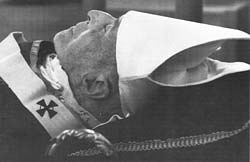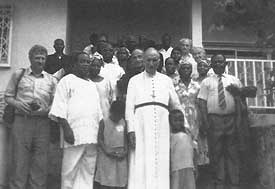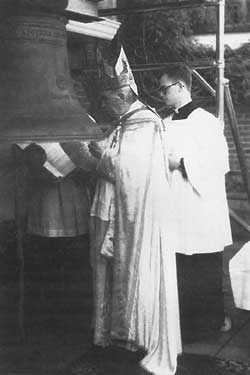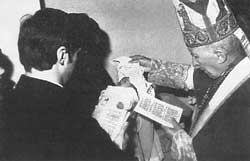Archbishop Lefebvre: In Memoriam, Pt. 1
Part 1
Rev. Fr. Michel Simoulin
 |
This account of the last days of Archbishop Marcel Lefebvre was written by Fr. Michel Simoulin, who was at the time rector of the Society's seminary in Ecône, Switzerland. It is taken from Les Cahiers de Controverses, No. 1. It has been translated from the original French and appears for the first time in English. |
Saturday, March 9. 6:50 a.m. We are at prayer. A step is heard in the chapel. Rémy Borgeat taps my shoulder and asks me to follow him outside. "The Archbishop is here," he said. "He is alive, but ill." I immediately go to find Fr. Puga in the chapel and we assisted the Archbishop to his room.
Yesterday evening he had felt a little better and had an omelet with some broth before retiring, but all night he suffered again on one side of his abdomen. Not being able to stand the pain any longer, he woke Rémy Borgeat at about 4:00 a.m. to take him back to Ecône. He asked that Mr. Grenon, director of the hospital at Martigny, be called to hospitalize him at once. As soon as he was notified, Mr. Grenon prepared to receive the Archbishop. About 7:15 a.m., the Archbishop was taken to the hospital, accompanied by Fr. Puga. The community was asked to pray for the Archbishop before the 7:15 a.m. Mass. As soon as possible the entire house was alerted as well as the Superior General, who was at St. Gall, Paris at that time.
|
JUNE 1989. The Archbishop pays his last visit to Gabon. |
The entire morning was spent in examinations. At the end of the morning, the Archbishop was committed to the surgical ward, Room 213. After lunch I went to the hospital to find Fr. Puga; I visited the Archbishop and gave him a relic (some hair) of St. Theresa of the Child Jesus which belonged to Fr. Le Boulch. The Archbishop tried to rest and catch up on his sleep, but the pain was too severe. He was receiving infusions and the doctors prescribed a strict diet.
The Archbishop was in good spirits, taking things with simplicity and placing himself in the care of Divine Providence, the doctors and us for all that may be necessary. He placed the relic under his pillow and begged me to put his ring and pectoral cross safely in a pocket of his cassock. For himself he kept only his watch, his hearing aid, his rosary and his breviary, which he tried to say. He was worried about Paris, the planned meeting...and recalled the death of his sister, Jeanne. He was to refer to it several times during visits...
She died a little like the Blessed Virgin...she was a little tired and went to bed. A sister went to prepare an some tea for her and when she returned...pouff...she was gone! Like a "dormition"...she went gently to sleep without suffering. That would be a beautiful death! The trouble was she did not have the sacraments...like the good Fr. Le Boulch. It is truly a pity, but still a beautiful death. That may be well! Afterwards...taken to the vault and it is over.
5:00 p.m. I returned to the hospital to bring Communion to the Archbishop, accompanied by a deacon. The Archbishop was in bed, with Mr. Grenon and Fr. Puga by his side. When the Archbishop saw us, he recollected himself and his visitors left the room. We prepared a temporary altar. The Archbishop's breathing showed that he was in pain, which never left him. Having put aside his hearing aid, he had trouble following the prayers, but he piously recited the Confiteor and received his Savior with the simplicity of a child. After several moments of thanksgiving, he started the conversation. He spoke to us again of the death of his sister Jeanne, and complained of the severe Lent imposed upon him, showing us the placard suspended above his bed: Fasting! "Not even a drop of water! I only have a right to moisten my mouth without swallowing it."
The Archbishop awaited results with confidence, but still suffered very much. "It feels like a fire burning my stomach and going up toward the chest." For an hour the doctors inclined toward a diagnosis of inflammation of the colon, and wished to try to avoid an operation. It would be necessary to await the results of the first tests and proceed to other tests in order to know with precision the nature of the illness.
The Archbishop was anxious again about the conference in Paris, but was reassured when I informed him that Bishop Tissier de Mallerais, then in Paris, had agreed to replace him.
I asked him if he wished us to advise his family, but he hesitated. He feared the anxiety it might cause them and that his sister, Maria Theresa, living in Colombia, might make the trip unnecessarily.
We allowed the Archbishop to rest and promised to bring him Communion each day about the same hour; Fr. Puga would see him at other hours to check with the doctors concerning his treatment.
|
OCTOBER 7, 1990. The Archbishop blesses the bell in the cloister of the Carmel d'Eynesse. |
Sunday, March 10. In the morning I telephoned Mother Marie-Christiane, and in the afternoon Michael Lefebvre, who was preparing to leave for a vacation in the Alps. I also notified Mother Mary-Jude at St-Michel-en-Brenne. About 5:00 p.m., during Vespers, we carried Communion to the Archbishop. He was in bed sleeping. He tried to get a little sleep because the pain kept him from sleeping well.
We set up an altar more worthy than the last one which we left in the room as long as it would be useful. The Archbishop followed the prayers better than the day before and answered without difficulty. After Communion, he made his thanksgiving, a little longer than the day before. We chatted a few moments. I informed him of my calls and the many prayers which the entire world was offering to heaven. He did not respond, but contented himself with a smile and raised his eyes to heaven to signify "thanks be to God."
He apologized for causing us to miss Vespers, but in order to reassure us and to thank us, he said, "But you have done an act of charity. You bring me the best medicine. No one could have given me more than you have given me."
The Archbishop had had nothing to eat and complained: "I do not ask much, a good bowl of café au lait!" He admired the beautiful crucifix which we had placed on the altar in his room: "That helps to bear the pain," and he praised the hospital, which had a crucifix in each room, although less beautiful than the one we had brought. That, being a marvel, is too rare not to notice. But he added with a little sad smile,
But that is not worthy of a clinic run by religious... Here the nurses call me Mr. Lefebvre! The doctors call me Monsignor, but with the nurses, it does not matter. They are very devoted and very polite, but not like religious.
He added some surprising reflections. "You know, euthanasia is very easy. A nurse comes with a syringe...no one knows what is in it. She sticks you and says nothing! Afterwards: oh! he is dead...his heart has stopped. One must truly have trust."
"I do not know," he added again, "but I will ask you perhaps for Extreme Unction. It would truly be very foolish to go like that. One never knows, I am no longer young and anything can happen." The Archbishop again recalled the death of his sister, Jeanne, and of Fr. Le Boulch. "He did not wish you to give him Extreme Unction because he believed he would say Mass the next day, and then he was dead like that."
He was asked how many times he had already received the sacrament. "Once," he told me, "in 19??. It was Fr. Bisig who gave it to me. I was in the Sierre Clinic (Valais), and someone had given me penicillin. But it caused such a reaction that it seemed I was going to die. No one knew then that I had this allergy. And then Fr. Bisig came to see me with a satchel full of problems. He wished to speak to me, but I said to him, 'Instead, give me Extreme Unction, for I am dying!' This he did. And then afterwards, he set out again with his problems, but I was reassured. As to his problems, I had nothing more to say."
The Archbishop asked me again to alert La Peraudière School that he could not be there on March 19 as scheduled.
Monday, March 11. The doctors continue their investigations but are embarrassed because the Archbishop is a complicated patient by reason of his past medical history, African and European, and several allergies which impede certain tests or treatments (e.g. penicillin and iodine). They are then obliged to tread carefully in order to avoid the risk of making the Archbishop sicker. The Archbishop, on the other hand, is too discreet; not complaining, the doctors are almost obliged to scold him for not telling when he is in too much pain. He does not want to disturb the nurses either, and won't call them, even when he really is in need.
In the afternoon the Superior General pays a visit to the Archbishop to give him the good news of the meeting in Paris, and to keep him up to date, among other things, on projects for the future Mother House.
|
FEBRUARY 9, 1991. Archbishop Levebvre performs his last baptism. |
About 5:00 p.m., led by Mr. Moulin and accompanied by a deacon, I brought Communion to our patient. He is seated in a chair, still and meditating. It is thus that we found him at the time of our visit. On our entrance, he knelt down to receive his Savior. He communicated kneeling and sat down for a good thanksgiving. The nurses having given him a tranquilizer the night before, the Archbishop was well rested, but by afternoon the effect of the tranquilizer had worn off and the pain returned. However, when he spoke with us, the suffering left his face and it was smiling and peaceful as he conversed. Always patient, the Archbishop was a little surprised that no one had yet found the cause of his illness, admitting that he was not an easy patient to take care of because of his multiple allergies. He had not yet swallowed anything and found that to be truly a severe diet. "I told the nurses, you do nothing for me: I pay good money and you do not feed me!"
The Archbishop was uneasy with Mr. Moulin regarding the procedures and settling payment for the hospital bill. He spoke to us of the secularized attitude of the personnel: while they were very devoted, yet not one member dared to show him due courtesy. He recalled again the death of his sister, Jeanne, spoke of the good news of the trip to Paris as reported by our Superior General. We left the Archbishop about 6:00 p.m. for the spiritual conference and rosary. He excused himself again: "I have no more ring..." as regretting not being able to give us the joy of kissing it one more time.
When we were reciting the rosary, a footstep was heard in the chapel...someone tapped me on the shoulder...my heart stopped beating! It was Marcel Pedroni. I followed him with trembling. "The Archbishop tried to call here, but since no one answered, he called my house. He is asking for Extreme Unction. He does not feel well and wishes to put everything in order." I left for the hospital with him. It was about 7:30 p.m. I found the Archbishop in bed and prepared. He felt coldness spreading in his feet and legs. His circulation seemed to be poor. The nurse was alerted but did not seem alarmed. Still, the Archbishop preferred to put things in order. One never knows. The Archbishop received Extreme Unction with great composure and simplicity, his eyes closed and responding to the minister very clearly. Having presented the palms of his hands, he turned them himself to receive the anointing as fitting on his consecrated hands. He himself pulled aside the cover and sheet to present his poor feet, all swollen with edema which had afflicted him for many years, and prevented him from wearing low shoes. The Archbishop asked me to give him the Apostolic blessing granted for the moment of death. Everything finished, he reopened his eyes quietly and thanked me with one of his beautiful smiles, so full of the "good God" of whom he knew the secret and added: "As for the prayers of the dying, let us wait a little." At this precise moment, a nurse unexpectedly brought in a long-awaited comfort, some refreshments. The Archbishop is finally authorized to consume something. I was eager to pour the beverage for the Archbishop to delight him, when I heard him say to me: "Are you holding a service?"
In my haste I had kept on the surplice and stole while making my little culinary display, and the Archbishop put me in my place, laughing with a good heart and I with him. At this moment one of the doctors arrived. Dr. Tornay, who was treating the Archbishop, had been in surgery and came to see how things were going. He listened to the Archbishop's heart on all sides and reassured him about the sensation of cold. But the abdomen was swollen and that was less normal. But there was no need for anxiety. We departed in order to let the Archbishop rest.
Tuesday, March 12. In the afternoon Fr. Puga went to see the Archbishop and found him in good spirits, visibly at peace and reassured by the Extreme Unction. About 5:00 p.m., the hour which seemed best to take Communion to the Archbishop, we arrived. He was standing at the foot of his bed and was busy inspecting the contents of a plastic bag. He did not hear us but when he saw us, he stopped and recovered himself and moving with his I.V. stand, he went to sit down to prepare himself for Communion. He communicated kneeling and after his thanksgiving, we chatted as usual. "Last night I felt truly that I was going to die," he told us, "but now, it is not yet time."
Having asked if he were uneasy (with the treatment he was receiving), if he wished to be transferred to another hospital where he could see a specialist, he replied that he had received a telephone from France which had disturbed him more than anything else. Also, some visitors had also spoken critically of the medical attention he was receiving, but he placed full confidence in the doctors of Martigny. He said that he was very satisfied with them and for nothing in the world would he go anywhere else. If he could return to Ecône, that would be perfect. As for seeking a specialist, "I do not know any, and it is rather up to the doctors to decide that. It is their business, and if they felt the need, they would surely do it themselves. Besides, it would not be very tactful to do it ourselves." The doctors examined the Archbishop again but continued him on his "Lenten" diet. He had received, among other visits, a priest from Martigny who had brought him the sack which he was inspecting on our arrival. It contained a bottle of calvados (French brandy) and some chocolates. Friends sent him flowers and get well cards with signatures, parents, children... In short, the Archbishop seemed to be better; he seemed to suffer less than the day before. "If I did not have my I.V., I could say Mass, but..." At that time I dared a word of hope. "Perhaps you will be with us Saturday for the ordinations to the subdiaconate?..." "Yes, perhaps," he answered, "or else in a coffin!" In spite of everything the Archbishop was not yet able to pray his breviary and perhaps that lowered his morale. "So instead I do mental prayer...I am not good for much else. But that's a good thing!" Before leaving him, we asked the Archbishop to bless us, which he did willingly.
Wednesday, March 13. I left for Montalenghe, Italy, to see our retreatants. Undoubtedly, in order not to disturb their retreat, no one had told them about the Archbishop's illness. I informed them at the beginning of the holy hour. It was decided then to chant Oremus pro Antistite nostro as we do at the seminary up to March 24th. Fr. Rulleau brought Communion to the Archbishop.
Thursday, March 14. The doctors did some new tests on the Archbishop, having found some medicines that did not produce a bad reaction. Contrary to what had been thought, it was determined that the colon was intact, but a rather significant swelling (about seven inches) was discovered. It was then decided to do a scan; it would be done Friday afternoon at Monthey (Valais). Fr. Puga, who was to take Communion to the Archbishop, was prevented by a meeting with the doctors and asked Bishop Fellay, then staying at the seminary, to replace him. But it was later than usual and it was almost 6:30 p.m. before our Lord arrived at the Archbishop's. Now the doctors had decided to give him a real dinner in order to strengthen him before all the tests. This had been served nearly three-quarters of an hour before, and the Archbishop had not touched it. The nurses then carried it away under his brokenhearted gaze, but the Archbishop was stoic; his first real meal in one week...and this was the day we had chosen to make him wait! The next day the Archbishop remarked to Mr. Grenon: "You see, at Ecône, they have already forgotten me!" The Archbishop then received Communion from the hands of one of his bishops. In order not to delay the nurses any longer, the Archbishop shortened his thanksgiving and Fr. Puga went to find his dinner. But the Archbishop's stomach, undoubtedly strained by the fast, was satisfied with just a little...and hunger was quickly appeased before all had been consumed.
It was before the meeting with the doctors in which Fr. Puga participated, that Doctor R. said to him: "Father, I must confess something to you. I spent the day in company with the Archbishop for the tests...he is an extraordinary man, it is truly a joy to be with him. What kindness! One sees the divine goodness in his face. You indeed are honored to be close to him. One does not get the same image of him as the one presented by the journalists. I asked the Archbishop to pray for me." Dr. R. is not Catholic.



